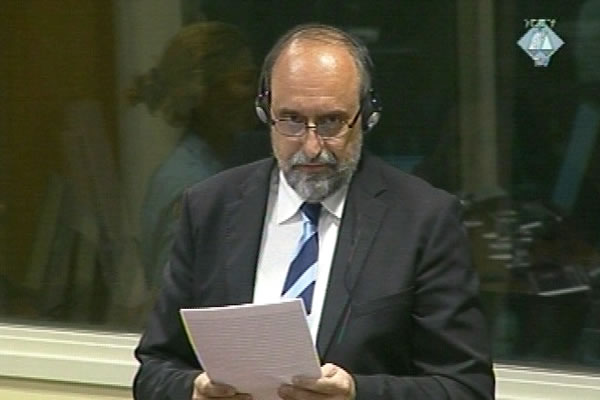Home
GORAN HADZIC’S DEFENSE CASE BEGINS
Goran Hadzic’s defense lawyer blames Arkan’s men, Seselj’s men and the JNA, urging the Trial Chamber to acquit his client, who is the former prime minister of the Serb Autonomous Region Slavonia, Baranja and Western Srem. Hadzic faces charges of crimes against humanity in Eastern Slavonia from June 1991 to the end of 1993. ‘If the accusations were true, if my conscience were not clear, would my family still live in Croatia?’, Hadzic asked as he made a statement in court without making the solemn declaration
 Goran Hadzic in the cortroom
Goran Hadzic in the cortroom Goran Hadzic is not responsible for crimes against humanity and war crimes in Croatia from June 1991 to the end of 1993, either as an individual or as a superior, Hadzic’s defense counsel Zoran Zivanovic stated at the beginning of his opening statement. Zivanovic called on the judges to acquit the former prime minister of the Serb Autonomous Region Eastern Slavonia and the former president of the self-proclaimed Republic of Serbian Krajina of the charges, which include the joint criminal enterprise aimed at a permanent elimination of non-Serbs from large parts of Croatia.
In a brief opening statement the defense indicated that the evidence would confirm that the JNA had had de facto power in Eastern Slavonia. Zivanovic reminded the judges of Zivota Panic’s statement that Zeljko Raznatovic, Vojislav Seselj and his men were ‘responsible for the problematic events’. Panic is the former commander of the JNA 1st Military District. The prosecution left the ‘real culprits’ slide and ‘avoided listing all the military personnel present in the area, who were actively commanding the units in 1991 and 1992’, the defense counsel noted. Instead, the prosecution called the soldiers that put the blame for the events in Eastern Slavonia squarely on local Serbs such as Hadzic, said his defense counsel.
Zivanovic noted that in the course of its case the prosecution tried to paint Hadzic as a ‘violent man with sinister plans’. In fact, Hadzic was just an ordinary family man, a former warehouse employee who wasn’t in a position to influence the events that launched him to a political function and ‘changed his life forever’.
In the final part of the opening statement, the judges watched the first part of a documentary made by George Bogdanovich, Yugoslavia: The Avoidable War. In the documentary, Slovenia, Croatia and the ‘German bid to recolonize the Balkans’ are blamed for the breakup of the former Yugoslavia. The documentary depicts Serbia as a victim. Slobodan Milosevic and Radoslav Brdjanin also showed the film in their defense cases.
After the opening statement, Goran Hadzic addressed the judges, first in a statement without making the solemn declaration, and then he proceeded to make the declaration in order to testify as the first defense witness. Hadzic explained why he decided to make the statement. The first reason was to express his regret for all the victims in the war that deserve the ‘same respect’. The second reason was the prosecution’s opening statement in which he was accused of tearing down mosques and churches during the conflict. ‘How could I destroy mosques? There were no mosques in the Serb Autonomous Region of Slavonia, Baranja and Western Srem and in the RSK’, Hadzic said.
The accused then tried to distance himself from the statements he gave to the media during the war. Hadzic explained that his words should be interpreted in the context of the events at the time. ‘I am not a robot, a lawyer or a genius, and I could not know whether the information I had at the time was correct’, Hadzic noted. In fact, Hadzic wants to testify in order to ‘present the real picture of the events’. There could be no two truths about one event, Hadzic stressed. In the case against the three former JNA officers charged with crimes in Vukovar, the prosecution blamed the military authorities for the events in Eastern Slavonia. In his case, the prosecution blamed the civilian authorities for the same events, Hadzic noted.
Hadzic stressed that he advocated the continued existence of the federal state, as did some Western politicians. At the end of his statement, Hadzic asked a rhetorical question: ‘If it were true that I ordered and organized expulsions and murders of civilians and the destruction of Croatian towns and villages, if my conscience were not clear, how could my wife and daughter still live in Croatia today, as they do?’
Hadzic then moved to the witness stand. For the next 30 hours, he will be questioned by his lawyer Zivanovic. Hadzic started his evidence with an overview of the events that led to his political career, from the League of Communists and the Party of Democratic Reform to the Serbian Democratic Party (SDS). In 1991, the SDS appointed Hadzic the prime minister of the Serb Autonomous Region Slavonia, Baranja and Western Srem. Hadzic will continue his testimony tomorrow.
Linked Reports
- Case : Hadzic
- 2014-06-24 FOUR-DAY WORKING WEEK AND 140 HOURS FOR HADZIC’S DEFENSE
- 2014-06-17 GORAN HADZIC WILL TESTIFY FIRST IN HIS OWN DEFENSE
- 2014-04-09 HADZIC’S VISITS TO BELGRADE AND NOVI SAD
- 2014-07-04 HADZIC DENIES CLAIMS MADE BY PROSECUTION WITNESSES
- 2014-07-07 HOW THE WAR STARTED, AS SEEN BY GORAN HADZIC
- 2014-07-08 ARMY HAD POWER, HADZIC HAD NONE
